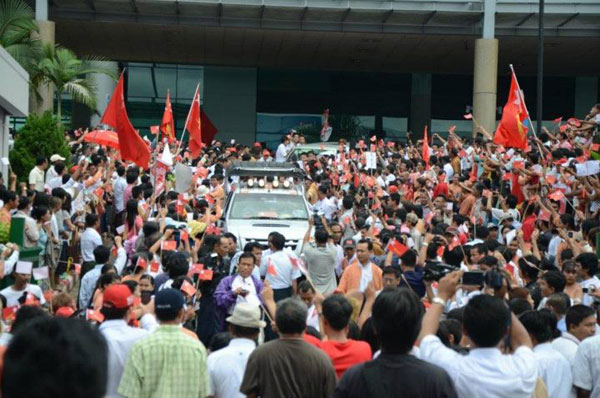[postlink]
https://burmacampaignjapanteam.blogspot.com/2012/06/after-22-years-us-senate-confirms.html
[/postlink]
WASHINGTON: Veteran diplomat Derek Mitchell's appointment as America's first Ambassador to Myanmar in 22 years has been confirmed by the Senate, the latest in a series of efforts by the US to bring the country out of isolation after five decades of military rule.
47-year-old Mitchell, who was till now the Special US Representative and Policy Coordinator for Myanmar, is expected to leave for that country soon.
"I congratulate Derek Mitchell on his confirmation as our Ambassador to Burma," said Senate Republican Leader Mitch McConnell.
"He has done an excellent job in his current role as Special Representative and Policy Coordinator for Burma; his experience will serve us well in the region as he builds on the strong foundation established by Michael Thurston and our embassy team in Rangoon (Yangoon)," McConnell said.
Earlier this week, during his confirmation hearing, Mitchell said if confirmed as ambassador to Myanmar he would work with both the opposition and the government.
"Perhaps the most important development of the past year, has been the partnership between Aung San Suu Kyi and President Thein Sein," he told members of the Senate Foreign Relations Committee during the confirmation hearing.
"President Thein Sein has proved to be a remarkable figure. We should never forget to recognise his extraordinary vision and leadership and the many reformist steps he and his partners in government have taken over the past year.
"Steps that have clearly reflected the aspirations, indeed sacrifices of millions of brave Burmese over many years," Mitchell said, noting that at the same time, the US has no illusions about the challenges that lie ahead.
Reforms, he said, are not irreversible and continued democratic change is not inevitable.
"We remain deeply concerned about the continued detention of hundreds of political prisoners and conditions placed on those previously released, lack of the rule of law and the constitutional role of the military in the nation's affairs. Human rights abuses including military impunity continue, particularly in ethnic minority areas."
Mitchell said the Obama administration has been quite consistent and direct in public and private about our continuing concerns about the lack of transparency in Myanmar's military relationship with North Korea.
Myanmar government "must adhere to its obligations under relevant UN Security Council resolutions and it's other international non-proliferation obligations," he said.
"... I will continue to make this issue of highest priority in my conversations with the government and be clear that our bilateral relationship can never be fully normalised until we are fully satisfied that any illicit ties to North Korea have ended once and for all," he said.
Derek Mitchell & Aung San Suu Kyi
47-year-old Mitchell, who was till now the Special US Representative and Policy Coordinator for Myanmar, is expected to leave for that country soon.
"I congratulate Derek Mitchell on his confirmation as our Ambassador to Burma," said Senate Republican Leader Mitch McConnell.
"He has done an excellent job in his current role as Special Representative and Policy Coordinator for Burma; his experience will serve us well in the region as he builds on the strong foundation established by Michael Thurston and our embassy team in Rangoon (Yangoon)," McConnell said.
Earlier this week, during his confirmation hearing, Mitchell said if confirmed as ambassador to Myanmar he would work with both the opposition and the government.
"Perhaps the most important development of the past year, has been the partnership between Aung San Suu Kyi and President Thein Sein," he told members of the Senate Foreign Relations Committee during the confirmation hearing.
"President Thein Sein has proved to be a remarkable figure. We should never forget to recognise his extraordinary vision and leadership and the many reformist steps he and his partners in government have taken over the past year.
"Steps that have clearly reflected the aspirations, indeed sacrifices of millions of brave Burmese over many years," Mitchell said, noting that at the same time, the US has no illusions about the challenges that lie ahead.
Reforms, he said, are not irreversible and continued democratic change is not inevitable.
"We remain deeply concerned about the continued detention of hundreds of political prisoners and conditions placed on those previously released, lack of the rule of law and the constitutional role of the military in the nation's affairs. Human rights abuses including military impunity continue, particularly in ethnic minority areas."
Mitchell said the Obama administration has been quite consistent and direct in public and private about our continuing concerns about the lack of transparency in Myanmar's military relationship with North Korea.
Myanmar government "must adhere to its obligations under relevant UN Security Council resolutions and it's other international non-proliferation obligations," he said.
"... I will continue to make this issue of highest priority in my conversations with the government and be clear that our bilateral relationship can never be fully normalised until we are fully satisfied that any illicit ties to North Korea have ended once and for all," he said.







































